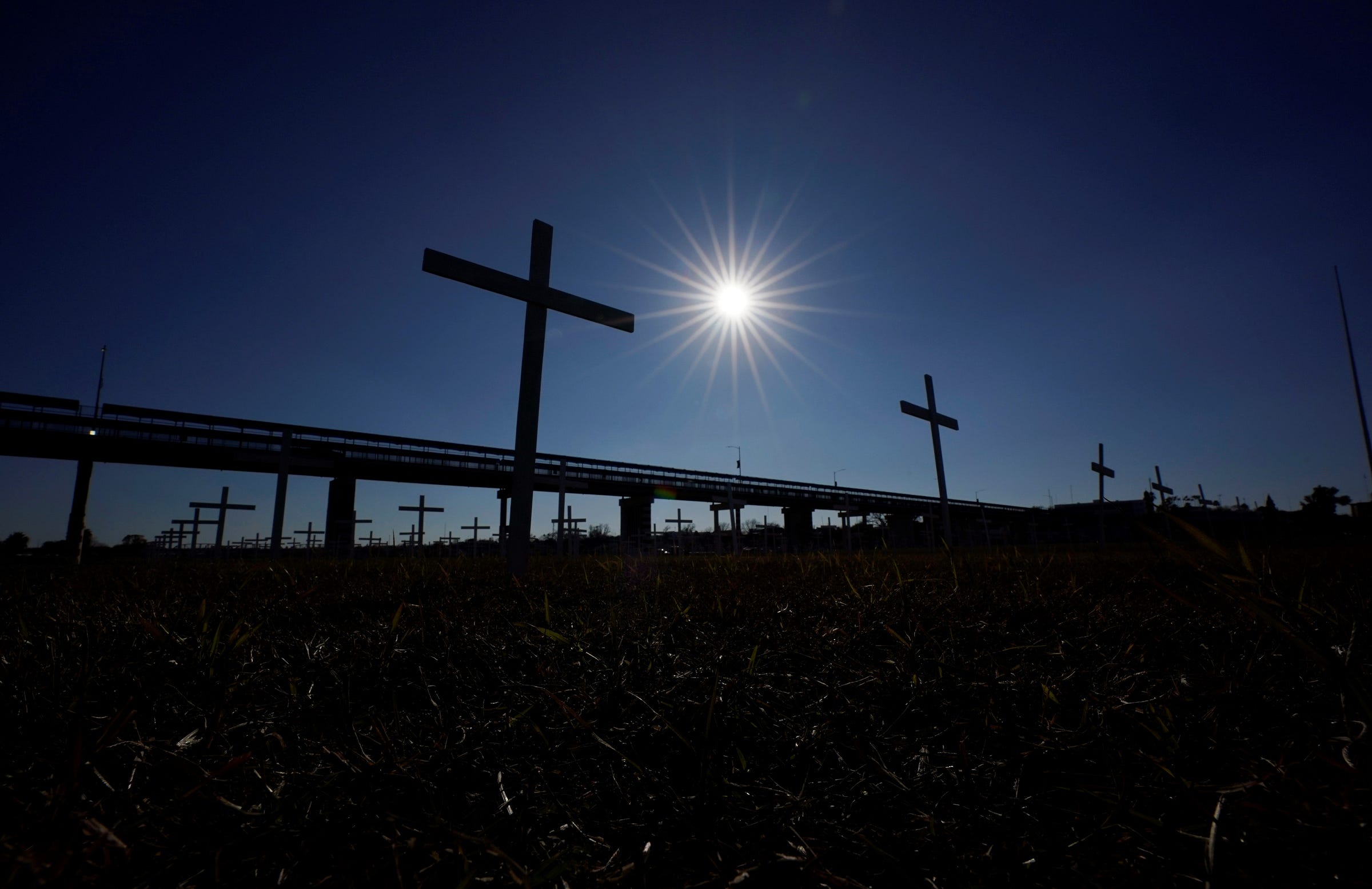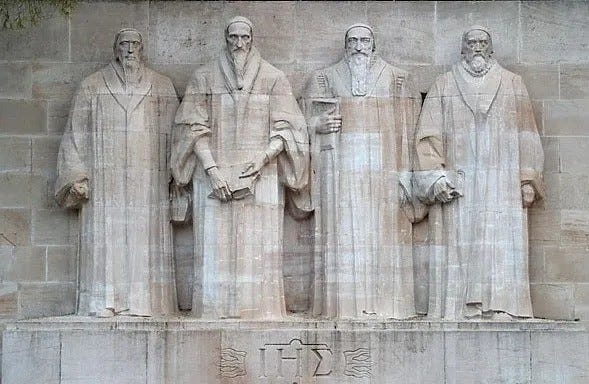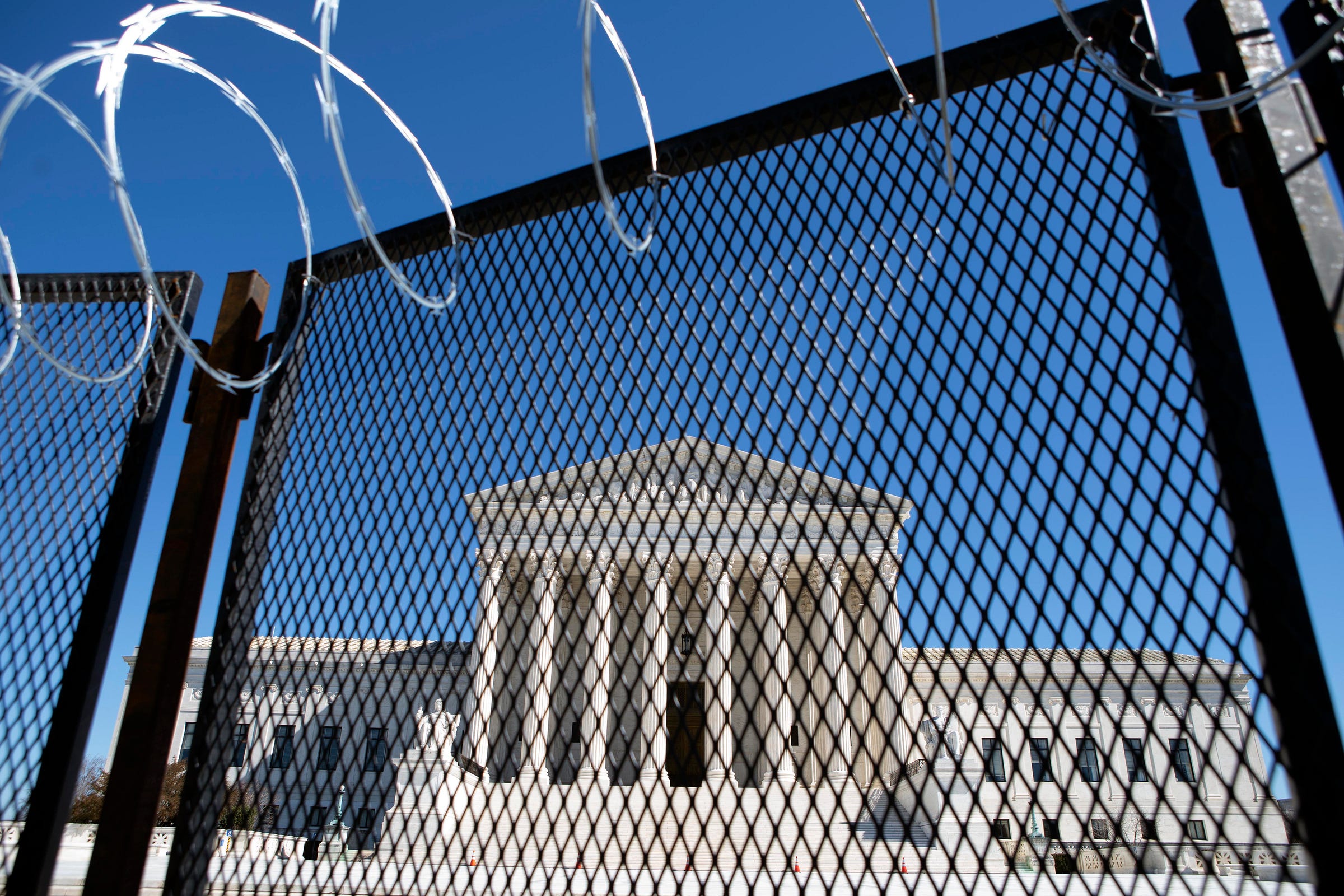The ‘Lesser Magistrates’ Threat to Democracy
As the Confederate States of America inaugurated their first — and only — president, Rev. Basil Manly Sr. stood on stage to offer the official invocation. A leader in the fairly new Southern Baptist Convention formed to defend slavery, Manly was an enslaver and a leading religious voice for secession.
Over 160 years later, some of his spiritual descendants are again preaching state sovereignty after the U.S. Supreme Court on Monday (Jan. 22) said Texas couldn’t prevent U.S. Border Patrol agents from removing barbed wire the state placed at the U.S. border with Mexico. Among the voices quickly making this argument was a professor of Christian ethics and public theology at Southern Baptist Theological Seminary, a school founded by Manly’s namesake son along with other enslavers and Confederates.
“This is an affront to Texas’s sovereignty and as the duly-elected magistrate, Governor Abbott should disregard it. If the federal government will not protect the border, Texas should, and this shouldn’t even be controversial,” Andrew Walker, also the opinions managing editor at World magazine, wrote on social media.

Walker was far from the only conservative urging Abbott to ignore the ruling of the highest court in the land. But among some conservative Christians, especially those with Calvinist leanings, a key phrase frequently popped up in their social media justifications for nullification: “lesser magistrate.”
“Pray for @GregAbbott_TX. May he fulfill his God-given role as a lesser magistrate & protect Texans (& all Americans) from evil policies & decisions,” wrote Tom Ascol, a Southern Baptist pastor in Florida who leads Founders Ministries.
“Time for Christians to remember and act on the Doctrine of the Lesser Magistrate,” declared Jed Brown, pastor of Grace Church in Elk Grove, California.
“From a Christian perspective, the just thing for @GregAbbott_TX to do is to exercise his authority as a “lesser magistrate” and refuse to comply with the SCOTUS ruling giving the Feds power to cut down the border fences. Justice for TX citizens = a closed border,” insisted William Wolfe, a graduate of Southern Baptist Theological Seminary who served in the Trump administration.
“The Reformation ‘doctrine of the lesser magistrate’ here. The governor of Texas, a civil authority established by God no less than he did the US president, has a duty to God to defend the good of the people under his care. ... @GovAbbott stand your ground! God bless you,” argued David Innes, a former politics professor at The King’s College in New York City who is now a pastor at Calvin Orthodox Presbyterian Church in Phoenix, Arizona.
Similar messages can be found from other pastors, seminary professors, and Christian writers. Beyond the moral concern of Christians advocating for deadly razor wire the week after a woman and two children drowned in the Rio Grande as Texas National Guard members blocked Border Patrol agents from the area, the invocation of this doctrine warrants attention. So this issue of A Public Witness heads to the border to consider the legal controversy and an obscure theological theory some hope will migrate into our political system.
Border War
Gov. Greg Abbott and the Biden administration are currently engaged in multiple legal battles over security and immigration at the southern border. The case Department of Homeland Security v. Texas began when Texas sued the federal government in October for interfering with the state’s use of its property by removing razor wire that Texas officials had placed along a stretch of the Rio Grande at the border.
Convinced that the Biden administration is not doing enough to stop illegal border crossings, Abbott had ordered the Texas National Guard to block the path of migrants by installing the deadly razor wire. But this also blocks U.S. Border Patrol agents from entering an area used to process migrant paperwork. Though federal-state disputes are fairly commonplace, this particular issue marked an unprecedented attempt by the state of Texas to block the Border Patrol from accessing part of the U.S. border with Mexico.
“I’m not aware of, and Texas hasn’t identified, a prior case in which state authorities physically impeded the federal government’s access to an international border,” said Stephen Vladeck, a University of Texas at Austin law professor.
Earlier this month as the lower court arguments continued, the Biden administration sought an emergency decision from the Supreme Court after Texas added additional razor wire barriers. That decision came on Monday when the court’s majority sided with the federal government. But this decision represented only five of the justices — John Roberts, Amy Coney Barrett, Sonia Sotomayor, Elena Kagan, and Ketanji Brown Jackson — agreeing that the federal government still controls border operations.

While this remarkably close decision could have been for technical legal reasons, Chris Geidner of the popular Law Dork newsletter (who went deeper into the legal weeds if you’re interested) saw the narrowness of the decision as significant.
“If a justice had a non-substantive reason, they chose not to explain their reasoning. And that is a choice — particularly where all four justices who disagreed with Monday’s decision did choose to publicly note their vote opposing the decision,” Geidner explained. “In other words, the dissenting justices wanted us to know this was a 5-4 vote.”
The lower Fifth Circuit court will hear oral arguments on an appeal from Texas next month, meaning this case will likely be back in front of the U.S. Supreme Court once again in the future. Especially since Texas isn’t backing down. Camilo Montoya-Galvez, immigration and politics reporter for CBS News, captured video of defiant Texas National Guard members beginning to set up even more razor wire the day after the Supreme Court decision was handed down.
The Lesser Doctrine
For American ears, the phrase “lesser magistrate” — especially when describing a governor instead of a judge — can conjure up images of a European society from a few hundred years ago. That’s appropriate since the idea arose in the writings of John Calvin and other 16th century Protestant reformers in modern-day France, Switzerland, and Germany.
That was a time of rulers declaring the religion of their territories, which sparked multiple wars between Protestant princes and the Holy Roman Empire led by the Catholic emperor. Defeat on the battlefield could mean the conversation (or reconversion) of a prince and his whole population — at least officially if not in the heart.
In that context, a theory emerged to justify disobedience to the emperor. While Calvin argued that Christians in general should submit to authorities, he wrote that princes or other magistrates could resist a tyrannical king. Believing that all in authority were placed there by God, those magistrates were accountable first to God and thus could justify not submitting to a human authority.
Many pushing this teaching today call it a “doctrine” because it shows up in the Magdeburg Confession, a 1550 Lutheran statement of faith from pastors in Magdeburg in between the two Schmalkaldic Wars pitting the Lutheran Germans against Emperor Charles V. In order to preserve religion, this confession justified the city’s political leaders resisting — with violence if necessary — imperial law to reconvert to Catholicism. While in Calvin’s Geneva, Scottish reformer John Knox advanced the idea in a 1558 book addressed to the nobility in Scotland. Theodore Beza, a French disciple of Calvin, also advocated for this position in his 1574 book The Right of Magistrates.
While Shakespeare’s plays from that time maintained their popularity, the writings about lesser magistrates largely fell into obscurity. But some have been working in recent years to revive the idea, insisting it should be honored as a Christian doctrine and applicable not just to 16th century princes but even to a 21st century democracy.

“If Congress, the president, or the U.S. Supreme Court makes an unjust or immoral law or decree, a state legislature or governor could stand in defiance of their unjust law or decree and refuse to obey or implement it,” Matthew Trewhella, a pastor in Wisconsin, wrote in his 2013 book The Doctrine of the Lesser Magistrates: A Proper Resistance to Tyranny and a Repudiation of Unlimited Obedience to Civil Government. “Those lesser magistrates could, in fact, actively oppose such a law or decree. Even a city council or mayor could appropriately defy an unjust law or decree handed down by any higher authority.”
It might be tempting to dismiss a self-published book by an anti-abortion activist who’s been accused of preaching violence, but it’s been praised by then-Kentucky Gov. Matt Bevin and a Republican state lawmaker in Alabama who gave author-signed copies to his colleagues. Michael Flynn, Donald Trump’s disgraced National Security Advisor who helped plot the efforts to overturn the 2020 election and now leads the election-denying Trumpian carnival known as the ReAwaken America Tour, called Trewhella’s book “a masterful blueprint showing Americans how to successfully resist tyranny.”
In his book, Trewhella goes beyond just elected positions like mayors or governors being empowered to ignore laws and court decisions. He also sees police officers and members of the military as “lesser magistrates.” And they might be needed to stand against laws, like those protecting the rights of LGBTQ+ persons. As he urged Christians to support military officials who refused to follow such orders, he held up a Roman general conquering a city as a role model: “If Congress and the president continue to walk down this dark road of rebellion and anarchy, the military may someday have to rise up and interpose, as they have a long and prestigious history of doing. They may have to declare to our civil magistrates what Roman General Pompey stated to the magistrates of Messana — ‘Stop quoting laws to us, we carry swords.’”
In addition to fueling ways to oppose abortion and same-sex marriage, the lesser magistrates idea also gained popularity in response to mask mandates and other public health measures during the COVID-19 pandemic as a way of urging local officials to resist rules imposed by governors or courts. A Republican mayor in Tennessee specifically cited it as she argued against COVID-19 rules. And a Republican state senator in Pennsylvania cited “the doctrine of lesser magistrates” as he pushed for overturning President Joe Biden’s 2020 win in the Keystone State.
As the lesser magistrates idea gains popularity within a niche conservative community and expands in application to more issues of alleged violations of God’s law, some scholars are pushing back. Anna Rosensweig, a professor at the University of Rochester and author of Subjects of Affection: Rights of Resistance on the Early Modern French Stage, analyzed Trewhella’s book for a study published in Modern Language Quarterly.
“In addition to oversimplifying, Trewhella and his followers presume that ideas about resistance can be readily imported from the past to the present, eliding historical specificities,” Rosensweig wrote. “In Trewhella’s writing there are no historical disjunctions, discontinuities, or differences, only an evangelical flattening of time that offers self-evident truths.”
Chaos or Community?
There certainly is — and always should be — a place in the United States for resistance to authority. The right to protest is foundational in our nation. But calling on “lesser magistrates” to selectively disobey the requirements of democratic society leads us down a dangerous path. We simply cannot have functioning governance under the philosophy of “Romans 13 for thee but not for me.”
“The idea of conscientious resistance has an important place in our religious and political traditions. It does set limits on democracy, and all other forms of authority. That is what it is supposed to do,” Robin W. Lovin, an ordained United Methodist minister and emeritus professor of ethics at Southern Methodist University, told us. “But you cannot call on God to authorize things that don’t make sense. If you’re working for a border system that is secure, humane, and based on law, you can’t get there by increasing the number of people who are acting outside the law, even — or especially — if some of them are lesser magistrates.”
We need look no further than the example set forth by Rev. Martin Luther King, Jr. to see an effective model for civil disobedience that contrasts with the doctrine of lesser magistrates. King protested the evils of racism, poverty, and war in a way that bolstered democracy instead of weakening it. His tactics of active nonviolent resistance as well as his end goals were all operating within a flawed democratic framework in order to strengthen and expand it. He engaged in civil disobedience as a private citizen — not as someone who took an oath to uphold the laws. And even as he protested immoral laws, he still accepted the authority of those in power as he went to prison for breaking the law.
If widely accepted as a doctrine in the U.S., the lesser magistrates philosophy could lead to a breakdown of our constitutional system. If it just takes someone in any office — be it a governor, city council member, or police officer — to believe God doesn’t like a certain policy passed by those on the other side, then it would be hard to see any law enacted. Rather than recognizing authority and its various levels, this theory flattens authority to allow virtually anyone in any minor office to claim the divine right of a king.

Civil disobedience protests die out if not enough people back the policy and are willing to risk arrest. But if we’re just supposed to accept any so-called magistrate as doing their job even when they ignore court rulings or higher political powers, then our democratic system would fall apart — as it almost did on Jan. 6, 2021. With election deniers invoking the lesser magistrates framework, we can see how dangerous this idea can be for democracy. Perhaps it’s even how Speaker Mike Johnson, who says God put members of Congress in their positions, justified trying to overturn Biden’s election. Johnson now supports Texas’s defiance of the Supreme Court.
Of course, those pushing to apply the lesser magistrates idea don’t see the potential for near anarchy. Because they think they are the ones who speak for God. They’re not worried about those on the other side of policy positions being able to stand on this ground to justify not enacting conservative laws. Which is to say they don’t see this as a democratic tool that can change public opinion and transform laws through the democratic process. They see this as a way to implement their policies even when they lose the greater elections. It’s a tool to enact a theocracy.
Miguel De La Torre, professor of social ethics and Latinx studies at Iliff School of Theology, also sees the threat to democracy from applying the so-called doctrine of the lesser magistrates to the border situation in Texas.
“The Christian Nationalism to which Gov. Abbott subscribes is irreconcilable with basic democratic principles. The imposition of a White supremacist interpretation of God is essentially authoritarian, incongruent with the idea of a pluralist society,” De La Torre told us. “Freedom is exclusively redefined to only secure the liberties of God’s new chosen people at the expense of so-called nonbelievers. For democracy to flow for the benefit of all, then the God of Christian conservatives must die — and let the dead bury the dead.”
As a public witness,
Brian Kaylor & Jeremy Fuzy





My head hurts when reading the machinations these people indulge in to claim a moral high road. To use Pompey as a justifications for this prinicple is almost laughable. Pompey and Julius Caesar were involved in a bloody war for dominance over Rome and in the conquest of the Mediterranean world. Each may have claimed to have their particular god's approval but their battles nearly broke Rome and created the chaos in the outer colonies including Judea. But I digress. These are the same people who invoke Romans 13 when it suits them. Also to advocate violence is in direct contradiction to the Jesus and God that I know. I fear their god is power at all cost.